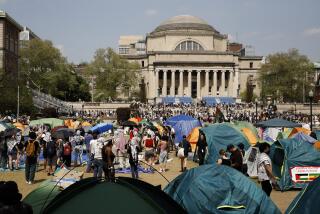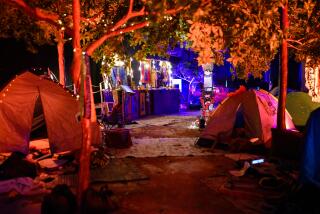From Riot to Rap : Jews, Blacks Spread Message of Racial Harmony in a Troubled N.Y. Neighborhood
- Share via
NEW YORK — Since the destruction of their temple in Jerusalem nearly 2,000 years ago, religious Jews have refrained from playing music on the anniversary of that calamitous event. This year, when that anniversary coincided with the anniversary of the race riots that engulfed the Crown Heights section of Brooklyn, a small group of ultra-Orthodox Hasidim broke with ancient tradition.
“I spoke to my rabbi and I said, ‘Our band has an opportunity to play for more than 10,000 residents of Crown Heights, all black, and spread our message of racial harmony,’ ” recalled maverick Hasidic musician David Lazerson. “I said, ‘Can we do it?’ ” The response came back swiftly: “To do work that will bring greater peace to the community, you’re obligated if you have the opportunity.”
Making music during the mourning period around the holy day of Tishah be-Av is not the only way Lazerson’s band has defied custom.
With its bearded members from the Lubavitcher Hasidic sect, this group sings not age-old East European melodies but joins with its black neighbors to belt out rap tunes about racial tolerance and religious understanding.
“Said, yo! Said, oy veh!”
Lazerson shouts at the start of one of his most popular numbers, performed with a fellow rapper, African-American Baptist minister Paul Chandler.
At the front of the stage, 16-year-old yeshiva student Yehudah Simon is hip-hop dancing along with a black youth, Thomas Joseph Moses.
“It takes a lot of guts to even try something like this,” said Chandler, an associate pastor at Crown Heights Fellowship Baptist Church. “In the Jewish community they say we have a lot of chutzpah.”
Astonishing some blacks and unnerving as many Lubavitchers, the group known as Dr. Laz and the Cure has forged a rare symbiosis in this Balkanized corner of New York City. Riots erupted here in August 1991 when a car driven by a Hasidic man accidentally struck and killed a black boy.
Hours later, a gang of blacks sought vengeance by killing a Hasidic scholar while chanting anti-Semitic epithets. Last month’s acquittal of a black teen-ager accused of the murder has exacerbated the conflict between the highly divergent communities.
The band performed this month at a local intercommunal basketball game, one of a series held in an effort to bring Jews and blacks closer together. Varying between six and eight members, the band has played at a reception for delegates to last summer’s Democratic National Convention, Brooklyn’s annual West Indian Day Parade and several outdoor concerts around the borough.
Dr. Laz and the Cure also appear often at the predominantly black Medgar Evers College in Crown Heights and at area high schools, where their rap routine is followed by discussions to help bridge the gap between two starkly different cultures.
In Crown Heights, Talmudic scholars in long black coats and fedoras share streets with jean-clad teen-agers in Malcolm X baseball caps and hooded sweat shirts. Kosher butchers frequented by Jewish matrons with gaggles of children in tow are set hard against shops purveying pork to African Americans and dreadlocked West Indian immigrants.
The Lubavitcher Hasidim have based their world headquarters in Crown Heights since 1941. Some 15,000 Lubavitchers, a branch of a pietistic movement of Judaism begun in 18th-Century Eastern Europe and driven by messianic fervor, live in a tightknit enclave shunning contact with their non-Jewish neighbors.
An influx of impoverished blacks, most from the Caribbean, has heightened competition for housing and government services within the crowded, decaying area. A study commissioned by Brooklyn Borough President Howard Golden on the anniversary of the riots found that the absence of interaction between blacks and Jews has bred decades of negative preconceptions about each group. Lazerson--Dr. Laz--is doing his best to demolish these through raps like this one:
Me and my boys overcame the hype
As we broke though each other’s stereotype.
We don’t murder, we don’t steal, we work hard to buy a meal.
We don’t do drugs to get our spirits flowin’,
Like to keep our brain cells alive and growin’.
I ain’t into money and I love to play ball.
It’s true my friend, one God made us all.
So as you go through life with your sisters and brothers
Remember, you can’t judge a book by lookin’ at the cover.
The group appears to be making some inroads toward eliminating ignorance among Jews and blacks alike.
“Hasidic kids come up to me and ask if I’m a rappin’ preacher,” said Chandler. “They want to know if I know any Hebrew. They say things and ask questions. That never happened before. Now the kids don’t go to the other side of the street when they see me.”
More to Read
Sign up for Essential California
The most important California stories and recommendations in your inbox every morning.
You may occasionally receive promotional content from the Los Angeles Times.













